Suejin Jung and Gustavo Miranda-Bernales
Pianist Suejin Jung brought a guest pianist to her February 15th recital at the Shoemaker Salon at Central Park West. Chilean pianist Gustavo Miranda-Bernales and Suejin took turns at the piano, ending with a four-handed duet.
Curtis Curtis-Smith: Etude No. 9
Gustavo Miranda-Bernales opened the recital with Curtis Curtis-Smith’s Etude #9 “for the Independent Rubato of the Right Hand”. A millenial work published in the year 2000, it quickly revealed its own unique and pleasant harmonic spatter. There were also hints of jazz and new age piano.
Debussy: Feux d’Artifice
Debussy’s Feux d’Artifice (“fireworks”) is a swirling, percussive drama. Mr. Miranda-Bernales gave a clear, jagged rendition, climaxing with a gut-punch from the bottom A of the Shoemaker Steinway, followed by a searing glissando and then fading away over a distant thunder of rolling bass.
Published in 1913, the work now appears to herald the opening salvos of the First World War.
Debussy: Étude 7 pour les degrés chromatiques
Suejin Jung played this challenging étude with ease. Musically, it felt somewhat harsh and unrewarding, but as a technical exercise it was impressive.
Debussy: Préludes, Book 1
Suejin Jung played the following well-known preludes from Book 1. I particularly appreciated the first, Les sons et les parfums. Apropos of nothing, Les sons ends with the same bottom A that I mentioned in Mr. Bernales’ Feux d’Artifice.
- Les sons et les parfums tournent dans l’air du soir
- La sérénade interrompue
- Ce qu’a vu le vent d’ouest
Franz Schubert: Fantasie in C major Op. 15 “Wanderer”
Schubert’s restless, charming Fantasie contains hints of the darker edge of his later sonatas. But even in Gustavo Miranda-Bernales’ commanding hands, it could not rise to the level of e.g. the great D 960 sonata in B flat Major.
Nevertheless, MIranda-Bernales’ compelling execution of this difficult work earned him raucus applause.
Frédéric Chopin: Sonata No. 3 in B minor
Chopin’s Piano Sonata No. 3 in B minor Op. 58 is like a tray of jewels spread in front of the listener. How can one describe such glittering beauty and magical craft?
I was struck by how balanced Suejin Jung’s presentation was. Each movement and every section felt not too hot and not too cold, but just right. Her Largo was exquisitely paced and luminous, Chopin at his most sublime.
And even the galloping Presto, which opens with weighty romanticism reminiscent of Schubert, was reined back sufficiently by Suejin that it morphed from manic to majestic.
For this reviewer, Suejin Jung’s Chopin was the highlight of the evening. It was still playing in my head on the long ride home.
Encore: Fauré Le Pas Espagnol
Le Pas Espagnol is the last section of Faure’s Dolly Suite for four-hand piano. For this rousing Spanish dance, the pianists sat together with Gustavo playing the primo (upper) part. It was a delightful way to close the evening, leaving everyone with a smile on their face.
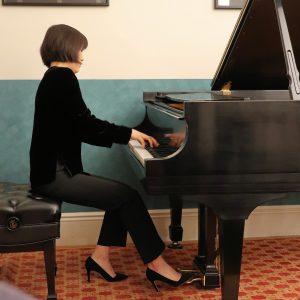
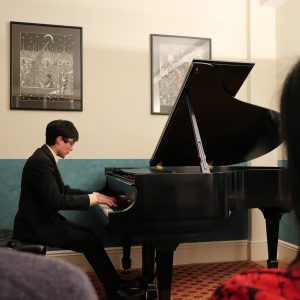
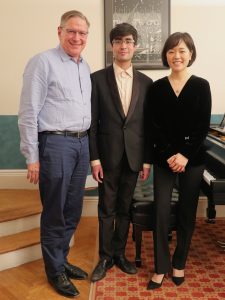
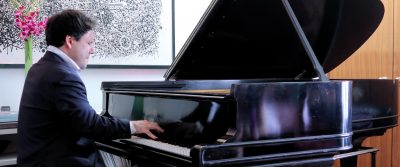
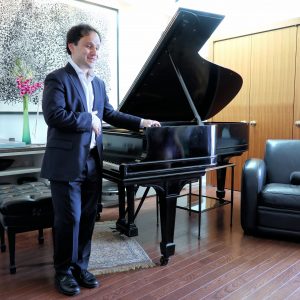
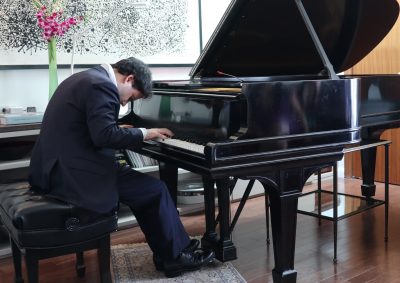
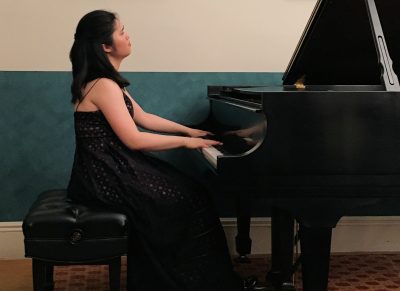
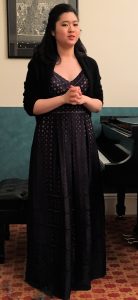
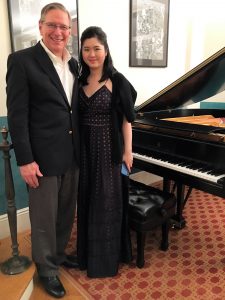
You must be logged in to post a comment.